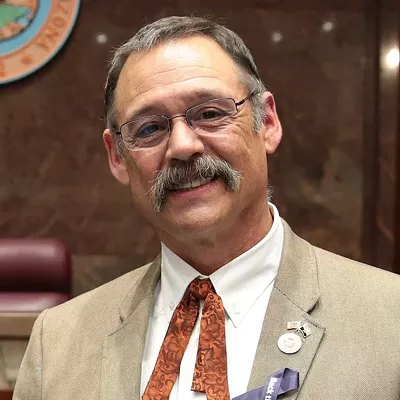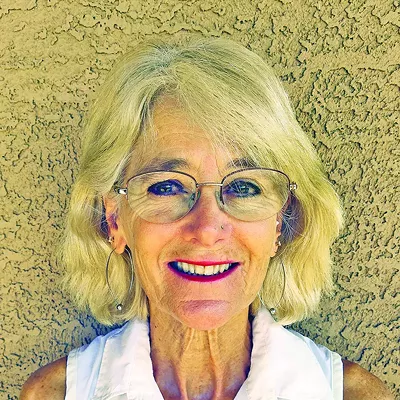The funny part is that we actually did it. Not only did we do it; we did it with an alacrity that was and remains completely out of character. Just one month later, we found ourselves driving a dangerously large and top-heavy moving truck across the heart of the country to a city with average yearly snowfalls of at least 34 inches, without even the prospect of a job between us. My wife left behind a steady and growing massage clientele; I left behind some choice bachelor furniture that didn't fit in the truck. We both left behind seven years' worth of friends, acquaintances, even some family.
What made us so eager to leave the comfortable familiarity of our desert home for the cold unknown of the post-industrial Midwest? Only that, along with everything else, we were also leaving behind temperatures in the hundreds and "dry heat" that seems to abandon you just when you need it most. For years, I had complained about the heat, pledging never to spend another summer in Tucson. I yearned for grass--long stretches of naturally occurring grass--and for tall, leafy trees and rivers with water in them. I suffered from a sort of seasonal affective disorder in reverse: I felt oppressed by the constant sunshine; I craved the atmospheric drama provided by occasional cloud coverage, rain, fog and, yes, even snow every once in a while.
"Are you crazy?" went the oft-repeated chorus sung by everyone who heard our story, Tucsonans as well as Clevelanders. "Six months of winter," went the verse the Clevelanders added. But we were deaf to their singing. Despite the fact that places like Cleveland are famously hemorrhaging population, jobs and tax revenue to places like Tucson (or, more accurately, Phoenix), we were determined to swim against the tide. We knew what we needed, and it wasn't in Tucson. Besides, from a basic survival perspective it makes sense--doesn't it?--choosing a green, fertile land over a desert.
We arrived in Cleveland at the tail end of summer, jobless and friendless, but charmed by our new surroundings. I was in love with the parks and their embarrassment of green, with the old red-brick storefronts. I was delirious with the swirling, melancholy beauty of autumn. I was enraptured by the magic of the first, soft snows.
So why did I miss Tucson?
My wife was the first to break. When she began to wax nostalgic about the Old Pueblo, I dismissed it as understandable, but temporary. Soon, however, I found myself browsing bookstores for anything Tucson-related--Barbara Kingsolver, Edward Abbey, Almanac of the Dead--craving good Mexican food and mountain views, and getting sick of the continually overcast skies. At the bottom of it all, of course, were the friends and family we had left behind. One day, shopping in a typically un-Western, two-story Target, we finally broke down and confessed to each other the full extent of our homesickness. I believe it wasn't more than a month later--New Year's Eve--that we were in a very familiar, oversized, top-heavy truck, driving across the country the opposite way.
Exactly four months and at least $2,500 in moving expenses later, we were back in Tucson, and a year after we first decided to move, we're undergoing the true test of our decision to come back. The hot and always-not-nearly-as-wet-as-I-would-like monsoon season is here, and we're struggling to stay cool in a tiny, swamp-cooled apartment.
Why do we stay in Tucson, those of us who aren't natives, snowbirds, desert lovers, retirees or Southwest aficionados? Deep down, we must all yearn for the same things: the greenery (case in point: Winterhaven, an entire community trying to maintain the illusion that they don't live in a desert), the bodies of water, the historic buildings, the occasional rain. But yearning for something doesn't make it yours, and home isn't always something you choose. You have to be alert enough to recognize it, or--if you're not so observant--move 2,000 miles away and see if it calls you back.









